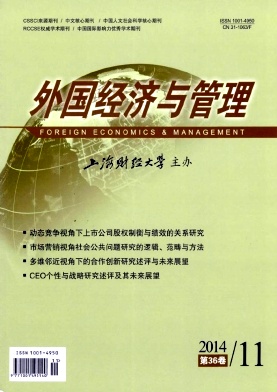家族企业继任满意感的影响因素研究——基于中国数据的实证分析
外国经济与管理 2014 年 第 36 卷第 11 期, 页码:63 - 70
摘要
参考文献
摘要
继任满意感作为衡量继任成功与否的重要指标,很大程度上影响着家族企业内部冲突、冲突程度及表现形式,进而影响继任进程。本文在Sharma(2003)研究的基础上,构建了家族企业继任满意感影响因素模型,采用实证研究方法对其进行检验,提出了影响我国家族企业继任满意感的影响因素模型。研究发现,继任计划、个人角色和家族经营是影响我国家族企业继任满意感的重要因素,前两者通过变量沟通互信进一步作用于继任满意度。此结论对于我国家族企业的继任过程具有一定的参考价值,同时也能为后续继任满意感的实证研究提供理论借鉴。
[1]Aldrich H and Cliff J.The pervasive effects of family on entrepreneurship:toward a family embeddedness perspective[J].Journal ofBusiness Venturing,2003,16:336-351.
[2]Bruno Dyck,Michael Mauws and Gray A Mischke.Passing the baton the importance of sequence,timing,technique and communication in executive succession[J].Journal of Business Venturing,2002,17:143-162.
[3]Handler W.Managing the family firm succession process,the next generation family members experience.Doctoral dissertation,School of Management,Boston University,1989.
[4]Habbershon and Williams.A resource-based framework for assessing the strategic advantage of family firms[J].Family Business Review,1999,12:1-25.
[5]Handler W.Successin in family firms:a mutual role adjustment between entrepreneur and next-generation family members[J].Entrepreneurship Theory and Practice,1990,15:37-51.
[6]James J Chrisman,Jess H Chua and Pramodita Sharma.Current trends and future directions in family business management studies:toward a theory of the family firm,Paper for the 2003Coleman White Paper Series.
[7]Kephenm and Ramon.A comparison of family-owned business:succession planners and nonplanners[J].Journal of Financial Service Professionals,2003,5:85-97.
[8]Lee M,Rogoff.Comparison of small business with family participation versus small businesses without family participation:an investigation of difference in goals,attitudes,and family/business conflict[J].Family Business Review,1996,9:423-437.
[9]Mathews,et al.Succession in the family firm:a cognitive categorization perspective[J].Family Business Review,1999,12(2):159-168.
[10]Poza E j and Alfred I.Stakeholders perceptions of culture and management practices in family and family firms-apreliminary report.Family Business Review[J].1997,10:135-155.
[11]Poza E j and Messer.Spousal leadership and continuity in the family firm[J].Family Business Review,2001,14:25-36.
[12]Robert Parrino.CEO turnover and outside succession a cross-sectional analysis[J].Journal of Financial Economics,1997,46(2):165-197.
[13]Sonnenfield and Jeffery.The hero farewell[M].New york,Oxford University Press,1988.
[14]Shepherd and Zacharakis A.Structuring family business succession:an analysis of the future leaders decision making[J].Entrepreneurship Theory and Practice,2000,24:25-39.
[15]Schulxe W S,Lubatkin and M H Agency.relationships in family firms:theory and evidence[J].Organization Science,2001,12:99-116.
[2]Bruno Dyck,Michael Mauws and Gray A Mischke.Passing the baton the importance of sequence,timing,technique and communication in executive succession[J].Journal of Business Venturing,2002,17:143-162.
[3]Handler W.Managing the family firm succession process,the next generation family members experience.Doctoral dissertation,School of Management,Boston University,1989.
[4]Habbershon and Williams.A resource-based framework for assessing the strategic advantage of family firms[J].Family Business Review,1999,12:1-25.
[5]Handler W.Successin in family firms:a mutual role adjustment between entrepreneur and next-generation family members[J].Entrepreneurship Theory and Practice,1990,15:37-51.
[6]James J Chrisman,Jess H Chua and Pramodita Sharma.Current trends and future directions in family business management studies:toward a theory of the family firm,Paper for the 2003Coleman White Paper Series.
[7]Kephenm and Ramon.A comparison of family-owned business:succession planners and nonplanners[J].Journal of Financial Service Professionals,2003,5:85-97.
[8]Lee M,Rogoff.Comparison of small business with family participation versus small businesses without family participation:an investigation of difference in goals,attitudes,and family/business conflict[J].Family Business Review,1996,9:423-437.
[9]Mathews,et al.Succession in the family firm:a cognitive categorization perspective[J].Family Business Review,1999,12(2):159-168.
[10]Poza E j and Alfred I.Stakeholders perceptions of culture and management practices in family and family firms-apreliminary report.Family Business Review[J].1997,10:135-155.
[11]Poza E j and Messer.Spousal leadership and continuity in the family firm[J].Family Business Review,2001,14:25-36.
[12]Robert Parrino.CEO turnover and outside succession a cross-sectional analysis[J].Journal of Financial Economics,1997,46(2):165-197.
[13]Sonnenfield and Jeffery.The hero farewell[M].New york,Oxford University Press,1988.
[14]Shepherd and Zacharakis A.Structuring family business succession:an analysis of the future leaders decision making[J].Entrepreneurship Theory and Practice,2000,24:25-39.
[15]Schulxe W S,Lubatkin and M H Agency.relationships in family firms:theory and evidence[J].Organization Science,2001,12:99-116.
引用本文
吕肖东, 丁浩, 潘见独. 家族企业继任满意感的影响因素研究——基于中国数据的实证分析[J]. 外国经济与管理, 2014, 36(11): 63–70.
导出参考文献,格式为:





 7453
7453  369
369

